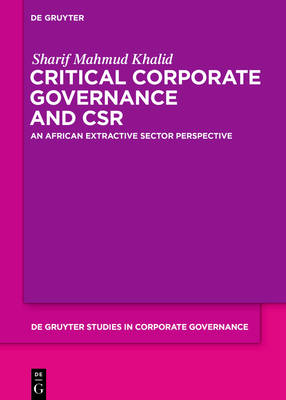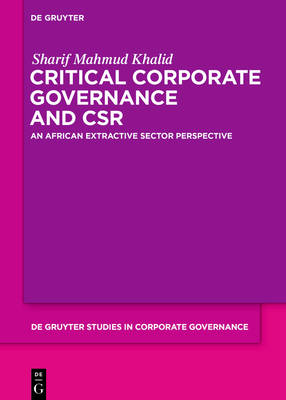
- Afhalen na 1 uur in een winkel met voorraad
- Gratis thuislevering in België
- Ruim aanbod met 7 miljoen producten
- Afhalen na 1 uur in een winkel met voorraad
- Gratis thuislevering in België
- Ruim aanbod met 7 miljoen producten
Omschrijving
This book addresses the relationship between corporate governance (CG) and corporate social responsibility (CSR) and does so in the context of extractive industries in Africa. Arguments are made as to what constitutes CG and CSR and whether or not one is a subset of the other. A series of case studies regarding governance, accountability, transparency and sustainability issues within the extractive sector are discussed. It proposes a model of good corporate governance for Africa's extractive sector.
CG and CSR have remained hotly debated subjects since their emergence. Evidence from these debates points to no apparent end in sight in the ongoing sustainability agenda. This book aims to augment the debate by filling existing gaps in research such as illuminating CG and CSR practices within the African context. The book seeks to analyse case studies to assess engagements between stakeholders and multinational extractive sector firms in the context of appreciating accountability and transparency. It is difficult to deny that there has been a modest surge in the field of mainstream social and environmental accounting in the last three decades or so, and it is still considered a growing domain within accounting research. Social and environmental accounting is seen here as a vehicle to reveal intertwined corporate and social events aimed at liberating and guiding society towards a just, accountable, transparent and sustainable pathway. This book applies Habermas' theory of communicative action and postcolonial theory in the critical examination of the practice of CG and CSR. Through qualitative content analysis of corporate annual/integrated reports of multinational extractive sector with operations in Africa and analysis of interviews with stakeholders of the extractive sector industry, the research reveals colonised features of the industry by multinational firms and in extreme cases racial issues. These issues represent obstacles to the attainment of accountability and transparency between firms and their stakeholders. The book proposes a corporate accountability framework reminiscent of indigenous local and international best practices towards a more stakeholder-centric model of multinational corporate accountability and transparency in the 'Third World'.
Case studies on Africa's extractive sector will be interspersed throughout the text including: mining in Ghana, South Africa, Zambia; and oil and gas in Angola, Equatorial Guinea, Ghana and Nigeria.
Specificaties
Betrokkenen
- Auteur(s):
- Uitgeverij:
Inhoud
- Aantal bladzijden:
- 106
- Taal:
- Engels
- Reeks:
- Reeksnummer:
- nr. 8
Eigenschappen
- Productcode (EAN):
- 9783110715378
- Verschijningsdatum:
- 31/03/2025
- Uitvoering:
- Hardcover
- Formaat:
- Genaaid
- Afmetingen:
- 170 mm x 240 mm

Alleen bij Standaard Boekhandel
Beoordelingen
We publiceren alleen reviews die voldoen aan de voorwaarden voor reviews. Bekijk onze voorwaarden voor reviews.












